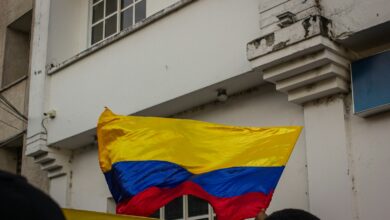Mexican Peso Volatility Reflects Political Uncertainty and Market Fears

The Mexican peso experienced significant volatility following recent elections, hitting 18 units per US dollar amid fears of potential constitutional reforms that could undermine the judiciary and autonomous institutions.
The financial markets in Mexico have been in flux following the recent elections, which saw the Mexican peso hit 18 units per US dollar. This volatility comes amid concerns that the ruling party, Movimiento Regeneración Nacional (Morena), along with its allies, the Labor Party (PT) and the Green Ecologist Party of Mexico (PVEM), could use their expected majority in Congress to push through constitutional reforms that may weaken the judiciary and eliminate autonomous institutions.
According to data from the Bank of Mexico (Banxico), the Mexican peso closed at 17.89 pesos per US dollar on Thursday, a depreciation of 2.03% from 17.53 the previous day. This drop follows a high of 18 pesos per dollar during the trading session, marking a 2.3% increase from the last session’s peak. In contrast, the peso’s low at Banxico’s close was 17.51, similar to the Wednesday closing figure.
This sharp decline follows a tumultuous “Black Monday” in the stock markets and for the peso, triggered by the electoral victory of Claudia Sheinbaum, who is set to become Mexico’s first female president. Investors are worried about the implications of a dominant Morena coalition in both houses of Congress, particularly the potential for sweeping constitutional changes without bipartisan support or dialogue with other political actors.
Political Fears and Economic Implications
Gabriela Siller, Director of Economic and Financial Analysis at Banco Base, commented: “The risk is not just about what they might do, but the anticipated reaction to what they are going to do. The currency’s fluctuation is related to constitutional reforms, not external factors.”
Siller highlighted that the peso was the most depreciated currency on the day and warned that the threat of these reforms also affected the Mexican Stock Exchange (BMV), the country’s main stock exchange. The BMV closed at 54,477.25 units with a marginal increase of 0.12%, following a 6.11% drop on the previous Monday, reflecting the market’s uncertainty and cautious optimism in the face of potential reforms.
An analysis by Intercam Casa de Bolsa pointed out that the announcement of the ruling coalition’s majority could undermine the country’s institutional framework. “The details of the initiatives are not yet known, and it is expected that they will seek consensus with (future president) Claudia Sheinbaum and the new Congress to determine and adjust these reforms. But we can anticipate that all of them weaken Mexico’s institutional framework, undermining checks and balances and steering the state towards presidentialism,” the analysis noted.
Latin America has a rich history of political volatility that has often had immediate and profound impacts on economic stability. In Mexico, for instance, political decisions have frequently triggered significant fluctuations in financial markets. The recent volatility of the Mexican peso is reminiscent of past economic crises, such as the Tequila Crisis in 1994, which was sparked by political instability and monetary mismanagement, leading to a severe devaluation of the peso and a deep recession.
The region has seen various instances where political shifts have caused market unrest. For example, Argentina’s economic woes have frequently been tied to political uncertainty, while Brazil has faced similar challenges, with markets reacting sharply to government and policy direction changes.
Potential Reforms and Market Reactions
The proposed reforms by Morena, PT, and PVEM could fundamentally alter Mexico’s constitutional landscape. While concerns revolve around possible changes to the judiciary’s structure and eliminating autonomous institutions that serve as checks on executive power, these reforms also hold the potential to streamline governance and enhance policy implementation. Such moves could centralize power significantly, echoing historical instances in Latin America where robust presidential systems have led to democratic backsliding.
Intercam’s report, “Elections 2024: Results and Implications,” suggests that the ruling coalition’s announcement adds uncertainty to the post-election landscape, heightening risk aversion. The report also warns that if these reforms are passed, risk premiums could increase significantly, leading investors to demand higher returns for productive investments in the country. This could potentially weaken Mexico’s investment attractiveness and hinder its economic growth. The potential economic implications of these reforms are significant, as they could lead to a decrease in foreign direct investment, a slowdown in economic growth, and an increase in unemployment rates.
Government Assurance and Investor Concerns
Two days ago, Mexico’s Finance Secretary, Rogelio Ramírez de la O, who has agreed to remain under Sheinbaum’s presidency, sought to reassure international investors. He confidently promised economic stability following the peso’s decline and the stock market drop on Monday, citing the country’s robust economic fundamentals and its ability to weather political storms. However, investor confidence remains shaky, reflecting broader concerns about potential abrupt and sweeping changes to Mexico’s economic and political systems.
The markets’ reaction underscores a fundamental tension in Mexican politics: the balance between necessary reforms and maintaining investor confidence. While the immediate impact of these reforms is causing market instability, historical precedents in Latin America show that well-managed reforms can drive long-term benefits, such as improved governance and economic performance. However, the challenge lies in managing these reforms in a way that minimizes short-term instability and maintains investor confidence.
Broader Implications for Latin America
The situation in Mexico is part of a larger pattern in Latin America, where political decisions and electoral outcomes often have immediate repercussions on financial markets. Countries like Argentina, Brazil, and Venezuela have experienced similar dynamics, where shifts in political power lead to significant economic consequences.
In Argentina, for instance, political uncertainty has often led to currency volatility and capital flight. Brazil has seen its markets react sharply to political scandals and changes in government policy. Venezuela’s ongoing economic crisis exemplifies how political decisions can lead to prolonged economic downturns.
These examples highlight Latin America’s interconnectedness of political stability and economic health. Investors are keenly aware of the risks of political changes, which influence their investment decisions and perceptions of market stability.
Navigating Economic and Political Challenges
As Mexico navigates the post-election landscape, the challenge will be to balance necessary political reforms with the need to maintain economic stability. Ensuring transparent and inclusive processes for constitutional changes will mitigate market fears and sustain investor confidence.
The government must communicate its plans clearly and engage with all stakeholders, including the financial community, to ensure that reforms are seen as legitimate and necessary rather than as power grabs. Even with a significant majority, building consensus will be important in maintaining the country’s democratic institutions and ensuring long-term stability. The involvement of all parties will not only enhance the legitimacy of the reforms but also foster a sense of shared responsibility and ownership among the stakeholders.
The volatility of the Mexican peso following the recent elections and the announcement of potential constitutional reforms underscores the delicate balance between political power and economic stability. As Mexico’s new leadership takes shape, the government faces the challenge of implementing necessary reforms while maintaining investor confidence and protecting the country’s democratic institutions. The proposed reforms could bring both risks and benefits: on one hand, they could lead to a more centralized and efficient government, but on the other hand, they could also undermine the country’s democratic institutions and economic stability.
Also read: Mexico’s Economic Challenges Under New President Claudia Sheinbaum
The broader Latin American context provides valuable lessons in managing this balance. Historical experiences from neighboring countries illustrate the risks and opportunities of political change. By learning from these examples and fostering a transparent, inclusive approach to governance, Mexico can navigate its challenges and build a stable, prosperous future.
The markets’ reaction to political developments in Mexico is a reminder of the interconnectedness of political decisions and economic outcomes. Ensuring stability in one requires careful management of the other. As Mexico moves forward, the eyes of the region and the world will be on how it manages this critical juncture.





